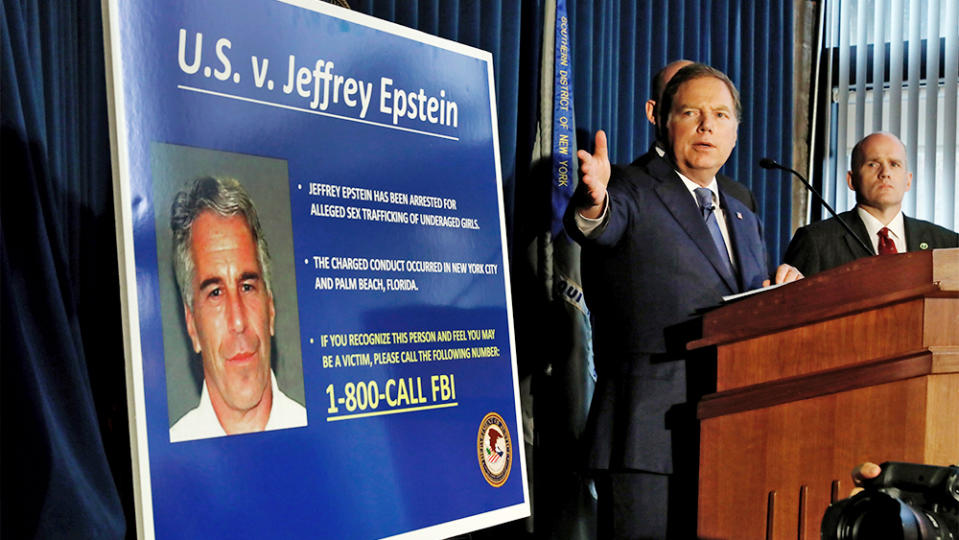Jeffrey Epstein Case Highlights Criminal-Justice Inequities, Power of Investigative Reporting

Click here to read the full article.
The sordid saga of Jeffrey Epstein has turned into a teachable moment for activists involved in criminal justice reform.
The criminal case unfolding in New York against the hedge fund manager accused of sexually abusing teenage girls also stands as a prime example of journalism’s role in holding the powerful accountable and putting a spotlight on shortcomings of the legal system.
More from Variety
Jeffrey Epstein Case Highlights Criminal-Justice Inequities, Power of Investigative Reporting
'Morning Joe' Airs Archival Footage Linking Jeffrey Epstein and Donald Trump
Secretary of Labor Alexander Acosta Resigning Amid Epstein Controversy
Epstein was arrested July 6 in New Jersey and is facing multiple charges of what prosecutors called “a years-long scheme to sexually abuse underage girls” at his homes in New York and Florida. He is being held in a Manhattan jail awaiting a judge’s ruling on his bail request.
In 2008, Epstein was convicted in Florida on two state charges of soliciting prostitution with a minor. But he had been facing more serious federal charges – involving molestation accusations from dozens of underage girls — until he was able to cut a deal with federal prosecutors in Florida that has come under harsh scrutiny. The Miami Herald in November published a multi-part investigative series examining the secret negotiations around Epstein’s plea deal.
The circumstances surrounding Epstein’s prior prosecution underscore the vast differences in the criminal justice system for wealthy defendants compared to those who don’t have the means to hire a fleet of high-powered attorneys. Epstein’s plea deal was overseen by Alex Acosta, who was then the U.S. Attorney for the southern district of Florida. He was appointed Labor Secretary for the Trump administration in 2017 but was forced to step down last week amid growing outrage over his role in Epstein’s previous prosecution.
“This case is a constellation of events,” said Andrew Cohen, senior editor at the Marshall Project, a non-profit journalism venture focused on criminal justice reform.
“You’ve got a rich defendant accused of being a sexual predator. You’ve got a secret plea deal that was handled by a future Trump administration cabinet member. To the extent that this angers people who are thoughtful about justice, this makes you wonder how many other times wealthy and connected people got breaks that minimized the rights of alleged victims.”
The Miami Herald series written by Julie K. Brown was the spark for the renewed law enforcement investigation into Epstein. It also led to the Justice Department opening up an investigation into possible prosecutorial misconduct in the case.
“The value of investigative reporting has been reaffirmed,” Doug Foster, a professor at Northwestern University’s Medill School of Journalism. “To take a look at the Epstein case and to think about how it would have played out absent Julie K. Brown at the Miami Herald, (there is a) good argument that without investigative reporting, he would’ve gotten away with it.”
That dogged approach has unearthed other scandals. Veteran music reporter Jim DeRogatis has spent nearly 20 years documenting the disturbing sexual abuse allegations against R&B star R. Kelly, who was arrested last week for the second time in the past six months to face charges of child pornography, forced labor and obstruction of justice in Chicago and New York.
“We’re looking for every shred, every document – ‘Can you show me the photograph? Can you show me the bank slip? Can I talk to your mother?’” says DeRogatis. “And that’s the one that always kills me. ‘Can I talk to your mother?’ It’s f—ing impossibly hard. And very few people are inclined to do it.”
That kind of reporting takes immense resources that newspapers often do not have. And even when the proper time and effort is expended, such stories may go unnoticed.
“Julie Brown was ignored for years,” he said.
The Marshall Project’s Cohen notes that the Epstein story also highlights the immense power wielded by federal and state prosecutors at a time when plea bargain arrangements are so common.
“This shows how pervasive plea deals are and how prosecutors get to act as judge and jury. (Epstein’s) story offers a great deal of education for the public about the ability to prosecutors to use their own discretion” in settling cases, he said. Judges have the power to review and reject such agreements but “most judges do not do that,” he said.
Sign up for Variety’s Newsletter. For the latest news, follow us on Facebook, Twitter, and Instagram.
